
©
Bundeswehr/Tom TwardyLithuania Brigade: Ready to protect the Baltic region
- Date of publication
The next milestone toward a permanent deployment of approx. 5,000 Bundeswehr personnel in the Baltic region has been reached. On 1 April, 45 Armoured Brigade had been activated to form the nucleus of the Brigade – now the official activation ceremony followed in Vilnius. Federal Chancellor Merz also attended the ceremony in Lithuania.
In 2023, Germany and Lithuania had agreed the permanent deployment of a Bundeswehr combat brigade at NATONorth Atlantic Treaty Organization’s eastern flank in the Baltics. The formation is part of the collective deterrence measures in eastern Europe which the transatlantic Alliance has stepped up in response to Russia’s invasion of Ukraine in 2022.
Ever since, the Allies have been working at full speed to implement this common project. While Germany provides the troops, Lithuania provides the military infrastructure. The Brigade will feature three armoured combat battalions: Two army battalions previously based in Germany will be permanently stationed in Lithuania. The third battalion to reinforce the formation will be the Multinational Battlegroup Lithuania. This Battlegroup is the former NATONorth Atlantic Treaty Organization enhanced-Forward-Presence-Battlegroup. It is under German command and has been active in Lithuania since 2017. The Brigade is to reach full operational capability by the end of 2027.
Germany takes its responsibility seriously. We are true to our word. And we stand by our friends. Always.
400 brigade personnel are already deployed in Lithuania. They reported for duty at Cathedral Square in Vilnius, together with their comrades from Germany. Deputations of the Lithuanian Armed Forces and the U.S. Army completed the formation. Before, the German military personnel had attended a service at the Church of St. Ignatius. Many families of Bundeswehr personnel were among the visitors of the Lithuanian Armed Forces’ garrison church.
The interest shown by local citizens stresses the importance of the Brigade for the Baltic state. Onlookers lined Cathedral Square, there were live broadcasts by TV. Parts of the city had been turned into a security zone because of the prominent guests: In addition to Lithuanian President Gitanas Nausėda and his Minister of National Defence, Dovilė Šakalienė, German Chancellor Friedrich Merz and Minister of Defence Boris Pistorius participated in this event of historical significance.
Germany is taking on responsibility
The Chancellor’s presence underlined the importance Germany and the Bundeswehr attach to the Brigade in Lithuania. It is one of the flagship projects in the wake of the paradigm shift in security policy triggered by the Russian war of aggression in Ukraine. Never before has the Bundeswehr embarked on such a complex project – and never before have timelines for implementation been that tight.
Lithuanian President Nausėda spoke of a special day. He went on to say that Europe was responding to the greatest challenges to our security in this century. The deployment of the Brigade was a valuable contribution to the protection of the eastern flank, Nausėda told the service personnel. “Thanks to your commitment all of Europe will be safer and stronger.” Lithuania would spare no effort to provide the best possible conditions for the troops from Germany, the president said. “We welcome you with an open heart and sincere gratitude.”
-
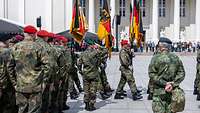
Protectors of the Baltic region: In future, the servicemen and servicewomen of the Lithuania Brigade will guard NATONorth Atlantic Treaty Organization’s eastern flank side by side with Lithuania’s Armed Forces. Some 5,000 members of the Bundeswehr will move to Lithuania for this.
©
Bundeswehr/Tom Twardy -
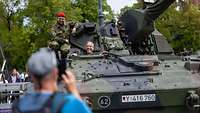
Concentrated firepower: Lithuania Brigade presents its combat vehicles to the citizens of Vilnius. PzH 2000 self-propelled howitzers and Leopard main battle tanks are on display on the parade grounds.
©
Bundeswehr/Tom Twardy -
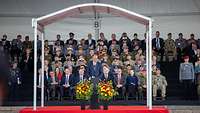
“A step into a new era”: In his speech, Federal Chancellor Friedrich Merz emphasises that Germany will not disappoint Lithuania
©
Bundeswehr/Tom Twardy -
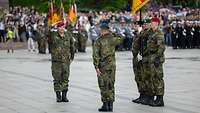
Taking command: Lieutenant General Alfons Mais (left), Chief of the German Army, hands over command of 45 Armoured Brigade to Brigadier General Christoph Huber
©
Bundeswehr/Tom Twardy -
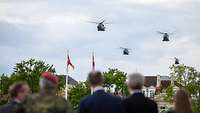
Helicopters in the sky: To mark the end of the ceremony, 17 Bundeswehr helicopters cross the skies above Vilnius to greet the city
©
Bundeswehr/Tom Twardy
“Today marks a step into a new era” Chancellor Friedrich Merz said. “Lithuanians and Germans together show that we are ready to defend Europe’s freedom against any aggression”, he went on. Merz reaffirmed that he wanted to turn the Bundeswehr into the most powerful conventional armed forces in Europe. During the Cold War, Germany had been able to rely on its Allies, the Chancellor remarked. Now it was time to give something back. “We will not disappoint Lithuania”, Merz said. “Germany stands by its responsibility: today, tomorrow, for as long as it takes”
Helicopters in the sky above Vilnius
Defence Minister Boris Pistorius turned serious when addressing the Brigade’s personnel. Currently and for the foreseeable future, Russia presented the greatest danger to security in the Euro-Atlantic area, he said. “Without security there is no freedom. And without security there is no sovereignty.” NATONorth Atlantic Treaty Organization needed to be strong, he warned, and had to systematically strengthen its deterrence and defence capabilities.
This was Germany’s topmost strategic priority as well, the Defence Minister went on. The Lithuania Brigade was an integral part of NATONorth Atlantic Treaty Organization’s land forces on the eastern flank, and in addition to that, the German Air Force and Navy would also continue to contribute to the security of Alliance territory. But the Brigade was not just a military formation, Pistorius said. “It is a symbol of trust – between nations, between people, between friends. It shows that we Europeans are stepping up, assuming responsibility, and delivering on our promises.“
At the end of the ceremony, 45 Armoured Brigade received its colours as well as the name “Lithuania Brigade”. 17 Bundeswehr helicopters flew over the city centre of Vilnius, which marked the end of the event. By late 2025, 500 Bundeswehr personnel will serve in the Baltic region. In February 2026, the Multinational Battlegroup Lithuania is to become part of Lithuania Brigade. By mid-2026, the Brigade will have grown to some 2,000 servicemen and servicewomen. The remaining earmarked Bundeswehr forces will follow as soon as the military infrastructure in Lithuania is in place.
Author: Timo Kather